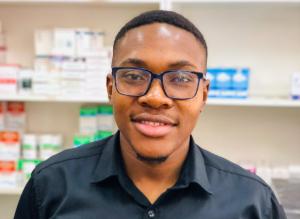Turning devastating health ordeal into life-saving campaign
“I was scared and terrified because I was still very young when I received the news. What else was going to save me if the medicines that are supposed to treat me are failing?” wonders Brandon Jaka, a 26-year-old pharmacist in Harare, in reminiscence.
Harare — Born with HIV, Jaka has lived his entire life relying on daily medication to suppress the virus. From an early age of 8 years, he learned to manage his condition through strict adherence to treatment and diet with guidance from his doctor and family.
For years, the therapy worked. But then, the drugs began to fail. In 2017 while in high school during a routine check, his viral load was too high, he says. Those in charge suspected that he was neglecting his medication, but it was not the case. His body stopped responding to the antiretrovirals that had he depended on since childhood.
“I had to undergo several tests and hospital consultations before I knew the problem,” he says. “When the results came back, doctors told me I had developed drug-resistant HIV.”
Drug resistance occurs when Microorganisms (viruses, bacteria, fungi or parasites) evolve and no longer respond to medicines that previously worked. Antimicrobial resistance is a serious global health threat. In the African region, high rates of illness and death are linked to resistant infections that are compounded by health system challenges.
In 2021 an estimated 4.7 million people globally died from antimicrobial resistance-related infections, of which over 1.14 million were directly attributable to bacterial resistance. sub-Saharan Africa bears the heaviest brunt.
For Jaka, the diagnosis was devastating. “It affected me physically, emotionally and mentally,” he says. “At that point, I didn’t know if I would survive.”
His doctor immediately switched him to a second-line regimen, a more complex and often more expensive treatment. The adjustment was difficult, but within months his health began to stabilize.
“It took less than a year for things to get back to normal after I was diagnosed,” says Jaka. “I realized I had been given another chance.”
As a qualified pharmacist, he decided to turn his experience into a learning point for others. He now dedicates his work to raising awareness about antimicrobial resistance and the importance of testing and avoiding self-diagnosis, which leads to irresponsible medicine use.
Through community outreach and storytelling, he has become a passionate advocate for responsible drug use. His advocacy includes public talks, digital campaigns and mentorship programmes aimed at young people living with chronic illnesses.
“My work reflects my purpose,” he points out. “I want to save lives, promote the responsible use of medicines and protect the treatments that saved me.”
Jaka is part of the World Health Organization (WHO) Task Force of Antimicrobial Resistance (AMR) survivors that elevates the voices of those with experience of complications from drug resistant infections. The members of the Task Force serve as champions to shape the AMR global narrative and influence policies that affect AMR.
WHO promotes awareness raising and behaviour change strategies to address the inappropriate use of antimicrobials. This includes supporting public education campaigns that encourage proper hygiene, vaccination and appropriate use of antimicrobials. WHO also promotes innovative approaches, such as engaging school-age children as AMR advocates and using digital and social media platforms to expand outreach and reinforce messages on the responsible use of antimicrobials.
Zimbabwe, like many countries in sub-Saharan Africa, has made progress in HIV treatment, but cases of resistance remain a challenge. Health authorities urge patients to stick to prescribed treatments and to avoid self-medication or sharing drugs.
Drug-resistance (Viral, bacterial, fungal or parasitic) is driven in large part by inappropriate use and lack of access to proper healthcare.
Globally more than one million deaths each year are linked to AMR, a figure expected to rise sharply if no urgent action is taken. In low- and middle-income countries, limited access to diagnostics and treatment monitoring often accelerates the spread of resistance.
“Everyone can help stop it (AMR)—by using antimicrobials responsibly and by listening to healthcare professionals,” says Jaka, whose viral load now is undetectable thanks to the effective medical intervention he received.
“Let us protect the medicines that protect us,” he says.
Communications and Media Relations Officer
WHO Regional Office for Africa
Email: saida.swaleh [at] who.int (saida[dot]swaleh[at]who[dot]int)
Communications and marketing officer
Tel: + 242 06 520 65 65 (WhatsApp)
Email: boakyeagyemangc [at] who.int (boakyeagyemangc[at]who[dot]int)
